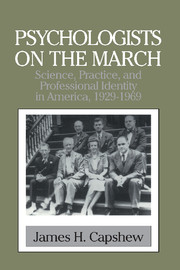Book contents
- Frontmatter
- Contents
- Acknowledgments
- List of Abbreviations
- Introduction: The Psychologists' War
- Interlude I
- 1 Growing Pains: After the Great War
- 2 Mobilizing for World War II: From National Defense to Professional Unity
- 3 Home Fires: Female Psychologists and the Politics of Gender
- Interlude II
- 4 Sorting Soldiers: Psychology as Personnel Management
- 5 Applied Human Relations: The Utility of Social Psychology
- 6 From the Margins: Making the Clinical Connection
- 7 Engineering Behavior: Applied Experimental Psychology
- Interlude III
- 8 A New Order: Postwar Support for Psychology
- 9 Remodeling the Academic Home
- Interlude IV
- 10 The Mirror of Practice: Toward a Reflexive Science
- 11 Beyond the Laboratory: Giving Psychology Away
- Interlude V
- Epilogue: Science in Search of Self
- Index
7 - Engineering Behavior: Applied Experimental Psychology
Published online by Cambridge University Press: 06 July 2010
- Frontmatter
- Contents
- Acknowledgments
- List of Abbreviations
- Introduction: The Psychologists' War
- Interlude I
- 1 Growing Pains: After the Great War
- 2 Mobilizing for World War II: From National Defense to Professional Unity
- 3 Home Fires: Female Psychologists and the Politics of Gender
- Interlude II
- 4 Sorting Soldiers: Psychology as Personnel Management
- 5 Applied Human Relations: The Utility of Social Psychology
- 6 From the Margins: Making the Clinical Connection
- 7 Engineering Behavior: Applied Experimental Psychology
- Interlude III
- 8 A New Order: Postwar Support for Psychology
- 9 Remodeling the Academic Home
- Interlude IV
- 10 The Mirror of Practice: Toward a Reflexive Science
- 11 Beyond the Laboratory: Giving Psychology Away
- Interlude V
- Epilogue: Science in Search of Self
- Index
Summary
Personnel work, ranging from the initial selection of soldiers to the rehabilitation of combat casualties, was at the center of psychologists' wartime effort. It absorbed the energies of the largest fraction of the profession and involved a large number of psychologists with no previous experience in test design, construction, and administration. Their work addressed the fundamental task of sorting manpower.
In the great triumvirate of personnel procedures – selection, classification, training – the third task presented a distinct set of challenges. Although existing mental testing techniques were readily adapted for the selection and classification of soldiers, as we have seen, it was less clear how psychology might contribute to the development of effective training procedures. Experimental psychologists, many of whom had previously worked mainly with animals, took up the challenge and applied their knowledge about sensation, perception, and learning to the problems of training people.
Almost from the start of the war, experimental psychologists were involved in applied research on the psychological problems engendered by modern weapons technology. Consciously or not, such weapons were designed with human operators in mind, and the engineers responsible for building them had to rely on some notion of human physical and psychological capacities. Some weapons, such as rifles, had evolved over such long periods that their basic configuration was set and largely unproblematic for the average user. Other technologies, such as range finders and fire-control devices on large shipboard guns, were newer, and the fit between the hardware and its human handler was not always good.
- Type
- Chapter
- Information
- Psychologists on the MarchScience, Practice, and Professional Identity in America, 1929–1969, pp. 143 - 154Publisher: Cambridge University PressPrint publication year: 1999



